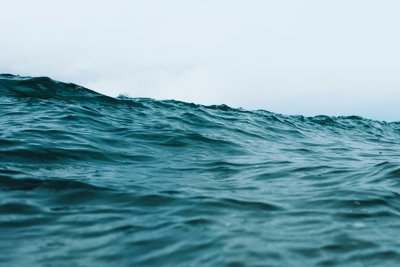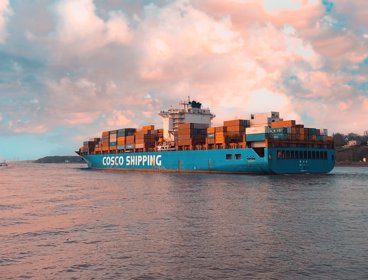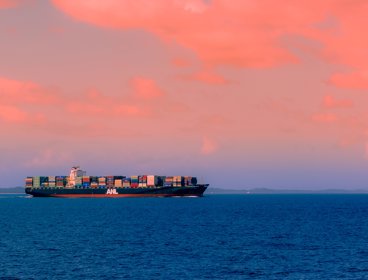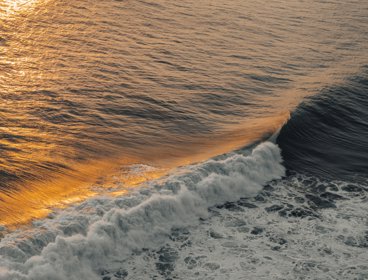Dr Kimberley Peters is a Lecturer in Human Geography at the University of Liverpool. She is Education Officer for the Social and Cultural Geography Research Group at the Royal Geographical Society (with IBG).
Her research has primarily focussed on the social and legal status of pirate radio and in particular that of Radio Caroline. From this she developed an increasing interest in the political control and legal regulation of the seas and oceans. We talked to her about the governance of the oceans and the challenges it may face in the future.
Why, broadly, do the oceans need management?
You will often hear the statistic that the oceans cover two-thirds, or approximately seventy two percent of our planet. Oceans are the dominant feature of the world we live in. However, they are not just important in terms of size. Oceans are vital to the environment, to society, to culture, and to the economy. They also matter a great deal politically as well. In short, they are essential to human life in many ways, so their management is vital.
For example, oceans are one of the world’s most fundamental providers of resources. However, increasing levels of CO2 in the atmosphere have been, over time, absorbed by the oceans. This has radically altered the ecosystems of these environments; changing plant life and correspondingly the fish that can exist there. This then has profound knock-on effects in terms of the sustainability of ocean environments and industries (such as fishing) that rely on the oceans. In another example, rich oil reserves can be found under the seabed. As such, oil rigs have been built to extract the fossil fuel that is so essential to modern society. Yet the question of who has the ‘right’ to such resources is highly contentious and rules around ‘Extended Economic Zones’ (or EEZs) have been established to manage the use of these resources. In a final example, ninety six percent of trade is carried on ships across the ocean. To ensure efficient and reliable trade flows the oceans need to be safe and secure. But with increasing threats of piracy, the oceans need to be managed by a collective of nations to ensure that ships and shipping routes are protected for the greater good.

Operations room staff patrolling the water via radar on board the destroyer HMS Edinburgh. (Flickr Source: UK Ministry of Defence)
How are the oceans managed?
Oceans are managed on both a national scale and on an international scale. On a national level, countries that have a coast are responsible for managing the ocean that is directly adjacent to their shore, of a distance of up to twelve nautical miles. This is often called the territorial sea. This area is effectively treated like the land in that the same rules and laws of the nation apply in this space. However, ships do have free right of passage into ports, using the territorial sea (wherever those ships come from!)
Yet coastal states can also claim a much larger area – up to two hundred nautical miles – through EEZs. EEZs allow countries to conserve and manage the economic resources that the deep sea can bring. They actually bring much of the world’s ocean space under management. They have been seen as a responsible way for managing the range of resources in available from our oceans.
Aside from EEZs, for the most part oceans are international spaces. They are not ‘managed’ or controlled by just one nation. This means they are managed ‘multi-laterally’ – in other words by many nations together. Introduced in 1982, the United Nations Law of the Sea (UNCLOS for short) is the guiding document that manages the use of the ocean. UNCLOS is interesting because whilst it sets out some firm rules for the use of the sea, it also tries to uphold and protect the freedom of the seas as a commons for all. There are lots of provisions in UNCLOS that help in managing the sea – for example the establishment of Marine Protected Areas (MPAs) and the International Fish Stocks Agreement.
Who are the other key players in the governance of the oceans?
The United Nations (UN) is the central organisation responsible for the setting the guidelines on the governance of the ocean. They also have a number of specialist organisations that help in the governance of the seas. For example the International Maritime Organisation (IMO) is the UN division for ensuring the safety and security of shipping, specifically. But aside from the UN, every country has a stake in managing the oceans because the UN is made-up of ‘member-states’ who help reach the international policies that have come to govern the uses of the oceans.
Also, whilst the law of the sea exists at an international scale, it is upheld by individual nations. The UN does not have a special provision of law-enforcers who operate at sea. As such, you will often find that national bodies such as the Royal Navy or US Coastguard will be responsible for ensuring the seas are secure and used fairly by all. There are also a range of non-military institutions on a national-scale that assist in governing the oceans. The Maritime Coastguard Agency (MCA) in the UK for example, helps to ensure that ships travelling in international waters do so safely, following navigational rules which will prevent collisions, and in accordance with rules concerning pollution.
There are also a range of other key players who have a role in ocean governance. These include charitable organisations. For example, the Migrant Offshore Aid Programme (MOAS) is an independent body that offers practical assistance to those migrating in often life-threatening conditions, by boat across the Mediterranean. There are also protest groups, such as Greenpeace and Sea Shepherd. These organisations have been powerful in opposing a range of activities at sea – from commercial whaling to nuclear testing. Their actions cannot be underestimated in holding accountable, the activities that occur in our oceans. 
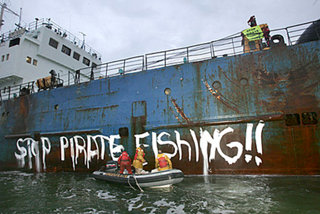
Protest groups such as Greenpeace (here seen stopping an illegal fishing boat offloading its cargo) have a role to play in ocean governance. (Flickr Source: Salvatore Barbera)
What specific problems have there been in the past?
The problems that have required governance at sea are wide-ranging - and sometimes surprising! For example, some of my own work has considered the governance of offshore pirate radio broadcasters. During the 1960s many radio stations located themselves on board ships to exploit the international space of the sea. At sea, beyond the rules and laws of land, they were able to transmit political messages back into countries, where they might then influence the people who listened. Governments were very worried in the past about the use of the sea for these kinds of potentially dangerous activities.
However, some of the most significant problems in the past for ocean governance relate to environmental issues such as over-fishing, whaling, and oil spillages. For example, many countries – Iceland, Norway and Japan in particular – have been involved in whaling for commercial and also scientific purposes. However, by the mid-nineteenth century whale populations were at threat and the International Whaling Commission (IWC) was set up in 1982 to try to regulate this activity. Additionally, there have been some very serious oil spill disasters – especially around the UK. In 1967 the vessel ‘Torrey Canyon’ collided with rocks off of the Isle of Scilly and the impact was disastrous for sea habitats, coasts and wildlife. About 120,000 tonnes of crude oil leaked into the ocean. The incident led to changes in the regulation of shipping – the most significant being MARPOL (the International Convention for the Prevention of Pollution from Ships). Sadly, however, many of the problems of governance in the past still exist today.
Why do you think people have traditionally treated the oceans with less care than the land?
I think that is an interesting question! People have treated the oceans with less care primarily because the oceans are not generally at the forefront of our minds. The majority of us live and work with our feet firmly on dry land. Even if we live by the sea, and our daily life is punctuated by the ebb and flow of waves, it is easy to forget how important the oceans are.
Consider geography for moment. It is an incredibly land-locked discipline. The word geography translates to mean ‘earth-writing’ – and broadly – geographers have been preoccupied with the earth or more specifically the land in their studies. On the one hand this is because the oceans can be difficult, dangerous and expensive to access in order to research them. On the other hand, for a long while geographers have simply deemed other spaces more important to study – typically the spaces that are more central to our daily lives; cities, towns, and so on.
But things are changing – people care more, and geographers definitely care more (there has been a real ‘oceanic’ turn in geographical study in recent years). In part these changes have been driven by an increased awareness of environmental issues – of climate change, sea-level rise, and ecosystem degradation – and an increased desire to be proactive in challenging the harm to our planet. I also think these changes are a consequence of the oceans becoming more and more prominent in daily life through the media. There is hardly a day that goes by without a news story about the oceans – about dredging, over-fishing, shipping disasters, piracy, and more recently migration. The oceans are far more visible now, so perhaps the tide is turning!
What challenges come about as a result of most of the ocean space being a commons?
Challenges arise when the seas are shared spaces, or commons, because we all have a right to them and also a responsibility for them. It is these ‘rights’ and ‘responsibilities’ that pose the real challenges for ocean governance.
For example, there are often challenges over who can lay ‘claim’ to certain areas of the ocean for resource exploitation (and the economic wealth that comes hand-in-hand with it). Nations have often competed for the rights to use ocean spaces for activities such as fishing and this has caused some very significant disputes. There has been much contestation around fishing in the North Sea, between Britain, France and other Northern European countries. Disagreements have been sparked over who has the right to fish, and where. This is because the EEZs can be claimed by more than one country in the North Sea because the countries are located so closely together.
There are also challenges that arise in terms of who is responsible for the oceans. If they are shared spaces it would make sense that we should all have a role in looking after them. Yet sometimes nations, and also industries, can shy away from their responsibilities because the oceans are a commons. We can simply say they are someone else’s concern. Indeed, even though there is a Law of the Sea, there is quite a lot of flexibility in terms of how individual countries actually interpret this into their own laws and actions at sea. This means that not all countries are responsible in their use of the seas for resource exploitation, and it also means that there can be confusion over who should assist when crises occur in our oceans.
Which part of the world’s oceans has the greatest need for governance and why?
I would have to say that every part of the ocean deserves our care and requires governance. However, there are some specific areas of the world’s oceans that currently under particular pressure.
Many would argue that places like the Gulf of Aiden (off of the Horn of Africa) and the Straits of Malacca (near Singapore) have the greatest need for governance in order to make the oceans safe and secure in the face of modern-day piracy. Piracy is a real threat to shipping trade. It disrupts the routes and voyages that are fundamental to the movements of goods around the globe, not to mention putting many lives at risk. There have been concerted efforts in recent years to govern our oceans in this respect.
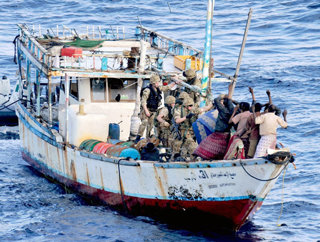
Royal Marines seize a Somali pirated vessel. (Flickr Source: UK Ministry of Defence)
It would also be argued that the Arctic Ocean has one of the greatest needs for governance in order to protect the environment. This area is facing increased pressure in terms of resource extraction, because important oil and gas reserves can be found under the sea. There is also a very real environmental pressure as tourism increases. Sensitive ecosystems and also cultural ways of life can be impacted by increased travel to areas like the Arctic - ironically, as travellers search out the ‘pristine’ wilderness to visit.
What are likely to be the biggest challenges facing the governance of the ocean in the future?
It is difficult to predict, but I suspect that there are two important challenges currently facing the governance of the oceans that will continue to be very significant in the future.
The first relates to the environment and more specifically to waste. Waste has always been a problem, but it is becoming more important with recognition that waste can irrevocably damage ocean environments. Waste comes in a number of forms. For a start there is waste from land that ends up circulating in the seas. This can harm wildlife at sea. Birds, fish and other sea creatures may become trapped in waste, or suffer poisoning if waste items are consumed. On a larger scale, ships that travel the world’s oceans will often carry with them ballast. This is the waste water that helps to keep empty ships balanced. However, when that ballast is discarded (the moment a real cargo is taken on board) it has the capacity to upset local ecosystems because the water (and the waste remnants it often contains) is not ‘natural’ to the environment where it is disposed. There are currently calls to better govern the world’s oceans in terms of ballast waste.
The second challenge relates to migration. There is a long (and troubling) history that connects migration and the sea. However, this relationship remains important today. Many desperate people – who face discrimination and persecution in the country where they live – are boarding vessels in order to reach distant shores where they may begin to build new lives. The seas offer people many opportunities for migration because borders are far more open and boats can dock or beach at numerous points along a shore. We have seen a huge increase in the use of the Mediterranean Sea and also the Indian Ocean for migration in recent years. Sadly, however, we hear news regularly which charts the ill-fated nature of these voyages that are almost always on unsuitable and dangerous vessels, without a proper captain or crew. The issue for governance arises in terms of how this situation is policed and how vulnerable people are protected. In the international space of the seas, who has responsibility for those who are caught up in these migrations? Geographers are currently exploring these very important questions.
Key Words
Commons
Land or water that is open to the public for their use and often has a shared ownership between them.
Dredging
The removal of sediment from the bottom of a river or sea, often undertaken to improve navigation or to obtain material to use elsewhere.
Ecosystem
A set of living organisms that interact with non-living components to create a system of inputs, processes and outputs.
Governance
The system by which a person, state or situation is controlled.
Migration
The movement of people in or out of a region or country.
Overfishing
Removing fish from the sea faster than they can naturally replenish themselves.
Piracy
An act of criminal violence at sea that can typically include kidnapping and holding up a ship for its cargo.
Lesson Ideas
Students can research a current ocean territorial issue and examine the value the ocean would hold for the different states making a claim. Then students can also examine the environmental, social and economic impacts any conflict over an area of ocean could have – both for the countries involved and for the wider global community.
Is the way the oceans are governed a fair deal? Who are the countries who would chiefly be in charge and make decisions and how might that be unfair for land landlocked countries? Students can discuss the nature of governance and why the control of any commons is inherently difficult.
Outlining a daily diary, students can examine the different ways in which they have needed the ocean either directly or indirectly that day. Key words such as trade, food and climate could be placed around the classroom to get them to think about the depth of their reliance on the oceans
Links
Kimberley’s book: Water Worlds: Human Geographies of the Ocean
Drifting: Towards Mobilities at Sea
Sinking the radio ‘pirates’: exploring British strategies of governance in the North Sea, 1964–1991
